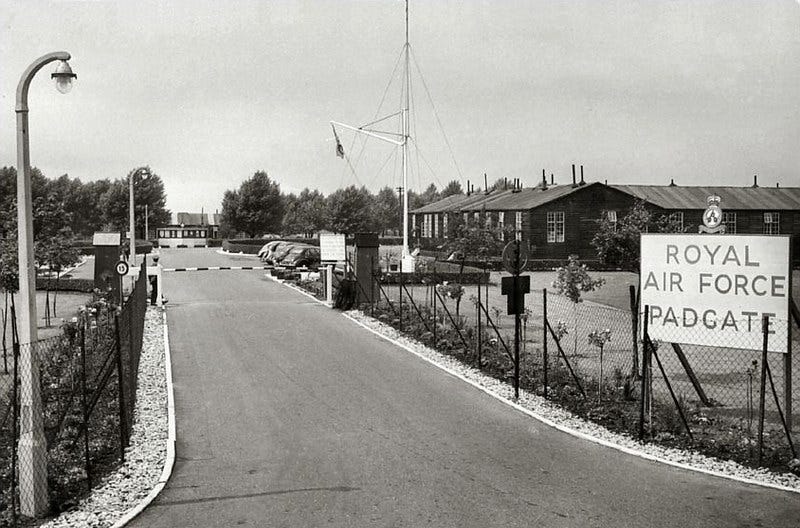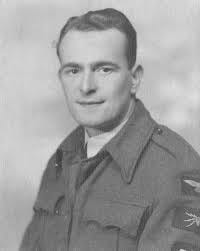Today, a new chapter from Harry Leslie Smith’s The Green and Pleasant Land. It takes place in the winter of 1941 at Padgate, where Harry is being square bashed by the RAF.
The Harry’s Last Stand project, which I worked on with my Dad, for the last 10 years of his life, was an attempt to use his life story as a template to effect change and remake a Welfare State fit for the 21st century. His unpublished history- The Green & Pleasant Land is a part of that project. I have been working on it, refining it, and editing it to meet my dad’s wishes. It should be ready for a publisher sometime this month or in August. This book of my dad’s ends with his eye witness account of the 1945 General Election. It makes for an interesting contrast to what was offered for Britain by today’s Labour Government during this summer’s General Election. Neoliberalism has definitely short changed the generations living in the 21st century.
Your support in keeping my dad’s legacy going, and me alive is greatly appreciated. I depend on your subscriptions to keep the lights on and me housed. So if you can, please subscribe, and if you can’t -it is all good because we are fellow travellers in penury. But always remember to share these posts far and wide.
The Green And Pleasant Land
Chapter Thirty-One:
The following morning, at the crack of dawn, a sergeant burst into our Nissen Hut and woke us with an explosion of curses.
There was a greasy fry-up for breakfast and unlimited mugs of strongly brewed tea.
Afterwards, we marched to a hut where our problem-solving aptitude was tested.” I was ordered to sit with others from my squad on a long wooden bench with a table in front of it.
Each of us was given a series of puzzles to complete. I connected blocks and then moved on to putting together jigsaw puzzles.
I arranged, attached, and connected these asymmetrical designs whilst being timed.
I had never done this before, but it wasn't difficult.
Others, however, handled this assignment as if bones from a human skeleton were placed before them- and then were asked to put the old bones back as a human being in under three minutes.
When done, we departed for another room where our ability to decipher Morse code was tested.
A cacophony of noises, scratches, beeps and blips was played over a loudspeaker.
“That, lads, is a dash. The short blip is a dot. Simple isn’t it? One long sound, one short sound, and we are making music.
“Now, I will replay it and want you to count the dashes and dots.”
My confidence deflated, and I had an uneasy feeling I was about to fail. I dreaded the notion that these new people, including Robbie, might make me the butt of their jokes.
I was given a pencil and a piece of paper where, at the top left of the foolscap, I wrote- dashes and on the right- dots.
I placed the tight black headset on over my ears.
At first, everything moved at an indecipherable speed. My brain comprehended nothing of what was being transmitted.
Then suddenly, each impulse sounded like an echo, distinct and unique. I was able to distinguish what was a dash or a dot.
When the quiz was terminated, the warrant officer said.
"Wait outside."
After ten minutes of shuffling and nervous jokes, the warrant officer appeared and called out the names of those who had passed. I was the last one to be called, but I had passed.
The third morning at Padgate was a mirror image of the second morning. We woke from warm beds and placed our feet onto cold floors. We dressed into our uniforms, ate the same breakfast and fell out for inspection.
Each day, the sky above remained a constant wintery grey spotted with Spitfires or Blenheim bombers practising flight manoeuvres.
Under it, every morning, we were ordered on a cross-country run that left us winded and drenched in sweat that stung our skin because the temperature hovered at the freezing mark. In the afternoons, we marched, we about-faced stood too or climbed ropes affixed to wooden scaffolds.
In the evenings, we were encouraged to write letters home. I didn't until the end of my stay at Padgate. However, I did receive a letter from my mother during the first few days of my RAF induction. She reminded me to share some of my RAF pay with her to keep my brothers fed.
During my short stint at Padgate, where I was trained to become cannon fodder, the war was a distant thunder for me- and most everyone else there. We were feral animals when it came to loathing other nations. So, we were taught to hate.
Required viewings of newsreels indoctrinated us to despise and loathe our enemy. But evil done on the continent or the threat of it to arrive by way of invasion was a difficult concept for many of us to grasp. It wasn't that we were naïve about malevolence because we weren't. Most of us were on a first-name basis with the evil of poverty as we grew up rough and ready during the Great Depression. Without articulating it, we understood that evil wasn't unique to one nation but shared equally by anyone with excessive wealth. We weren't like the youthful generation of 1914 who went to war to preserve a way of life that entrenched the working class to exist as penned animals for the benefit of the entitled. We lost our innocence in the 1930s and no longer feared or revered our so called, “betters.”
When news came that Buckingham Palace had suffered one bomb falling on it, there was a collective shrug of indifference. We wanted something more than a bread and drippings democracy.
Each morning, afternoon, and evening fell like the one before it. I marched, saluted, ate, joked, slept, and- on the following morning, woke to do it all over again.
" Up and bloody down, across and bloody back; I’ve walked to fucking Manchester and never been out the bloody gate in front of us.,”
On the tenth day at Padgate, we were issued wooden guns because the real ones were in short supply and needed by our soldiers at the front, which was in the North African desert.
Within a fortnight at Padgate, we were trained to fight the enemy whilst wearing gas masks. "You can't trust the Hun to fight fair." There was fear that- like the Great War chemical warfare was on order from Hitler.
I stood in a cement, windowless building with half a dozen other men and a warrant officer.
The warrant officer let off a smoke flare and screamed. "Gas, gas, gas."
I and the other men scrambled to put on our gas masks while the room filled with smoke that we were supposed to imagine was mustard gas.
The smoke devoured the oxygen in the room and reduced visibility. It induced claustrophobic panic in the occupants-drowning without the water.
Then, the door to the windowless block building was opened.
The warrant officer laughed at us as we stumbled out of the building like Saturday night revellers leaving a pub, weak-kneed and giddy. We pulled off our masks and sucked in the brittle march air into our lungs.
The exercise taught me that I did not want to die in a fire or by gas, but in my bed, old and very content.
Yet, there was something comforting about being in the RAF and having no free will because it came with the guarantee of three square meals a day and a bed to kip in at night.
It was no different for most of those square bashed with me. We all had come from places worse than Padgate. But once a member of the RAF, the past tense was erased from our reality. There was only the present and a future so far off on the horizon; it wasn't discernible to the naked eye.
"We were here because we were here."
Politics, in defence of democracy, our sodding British Empire, or Europe occupied by Nazis was not something often discussed. We didn't need to because we were socialists by being born into the hard trodden working class in the early part of the 20th century. Football, music, films and sex were the topics that we spoke about because we were young. Life was already short for the working class and during war time it was all the more precarious. Carpe Diem.
I did my duty to my country, which had never done its duty towards me or anyone in the working class, not out of patriotism.
I did it because- at eighteen years old- I failed to read the fine print of my contract with the King. He could use me and every other lad wearing a uniform until we were dead if he wished.
Three weeks into square-bashing, my squad was informed that we were moving to another RAF base in a week.
If we had any letters to write, we better do it now. I went into town that evening and had my photo taken in my new uniform.
I had a dozen copies made and posted them to various girls I knew in Halifax, along with a letter that wooed them as a proud airmen about to take up battle against the fearsome Nazis.
I also sent a letter to my sister Alberta. I didn't know what to say as she- in her own right was being square-bashed with far greater cruelty than me as a civilian.
She was pregnant, and her Dunkirk veteran husband had recently deserted the army- leaving my sister to fend for herself. Alberta endured societal scorn and continuous police surveillance as they attempted to arrest my brother-in-law, who had seen his share of war in France and said. "I want no more of it."
On the morning of March 18th, we lined up on the parade ground. We were presented with our travel warrant cards for further wireless training at St Athan in Wales.
Your subscriptions are so important to my personal survival because like so many others who struggle to keep afloat, my survival is a precarious daily undertaking. The fight to keep going was made worse- thanks to getting cancer along with lung disease and other co- morbidities which makes life more difficult to combat in these cost of living crisis times. So if you can join with a paid subscription which is just 3.50 a month or a yearly subscription or a gift subscription. I promise the content is good, relevant and thoughtful. But if you can’t it all good too because I appreciate we are in the same boat. Take Care, John


